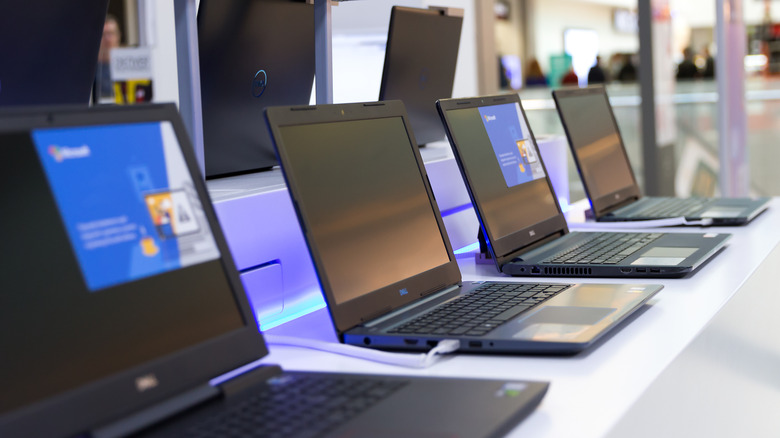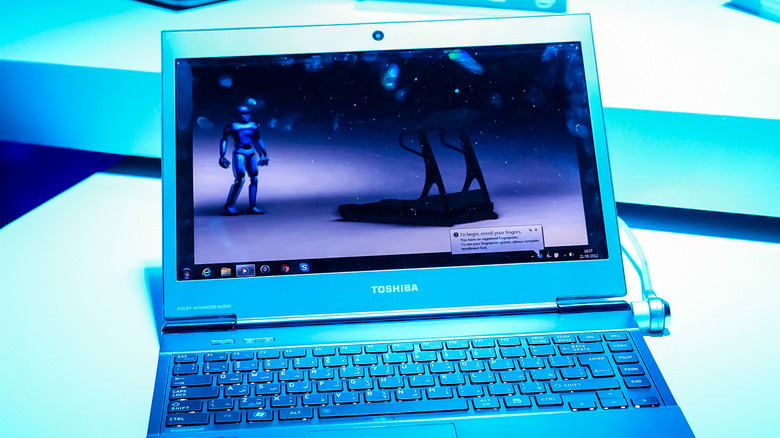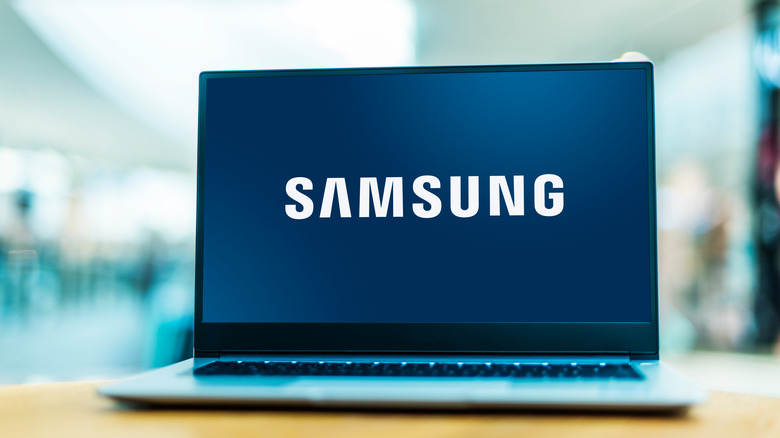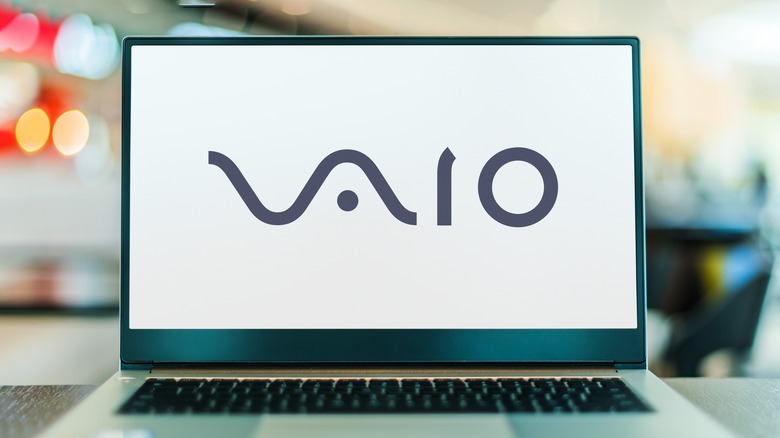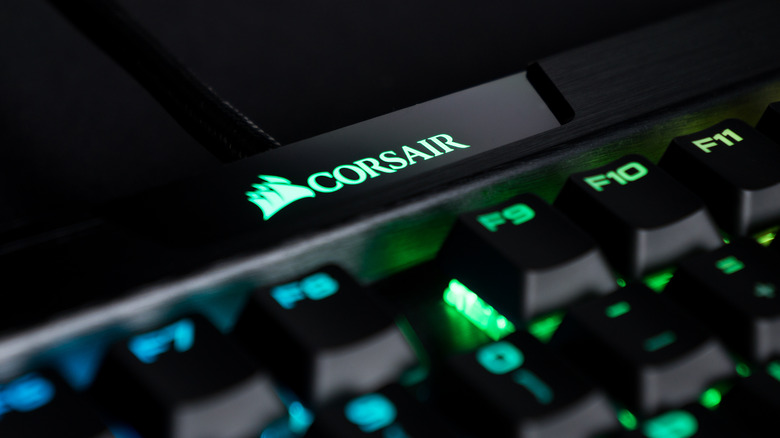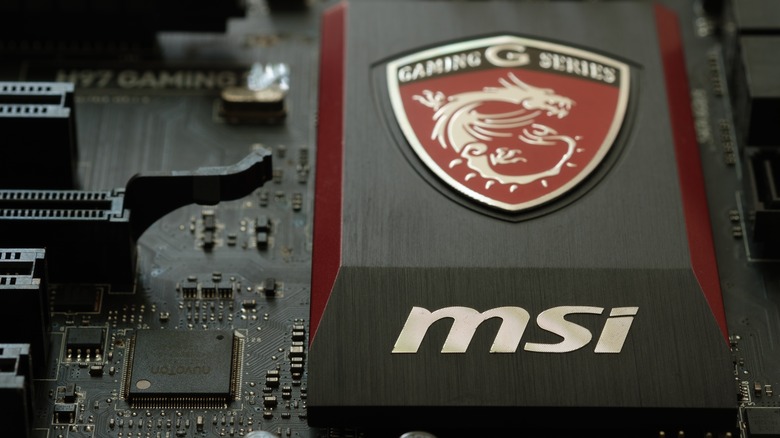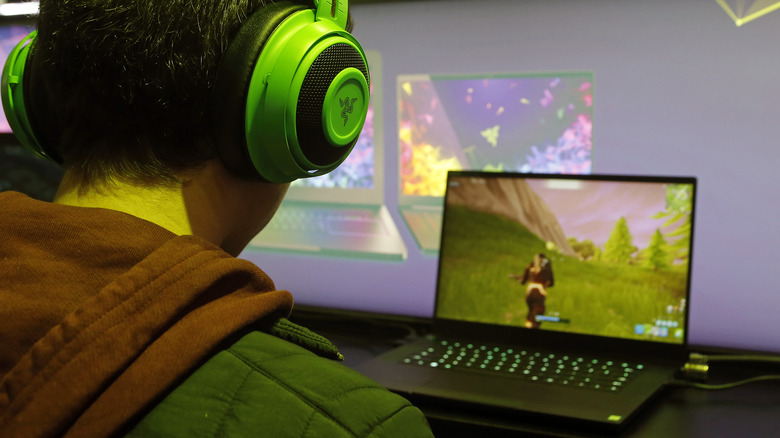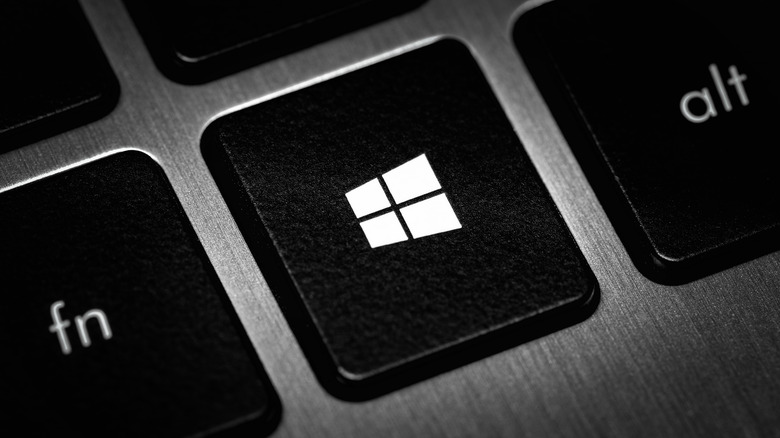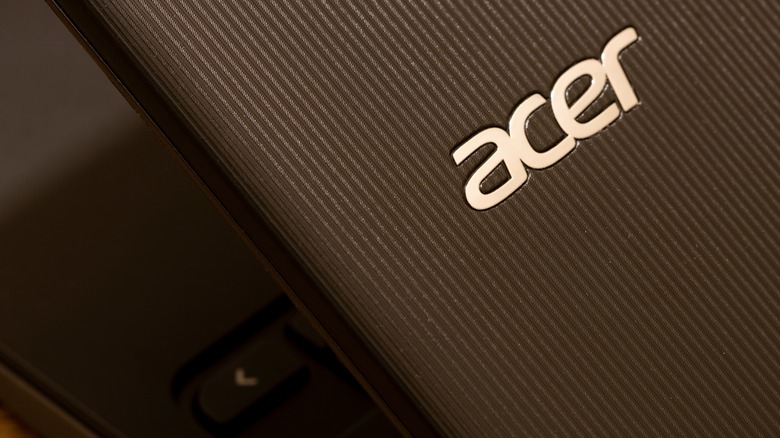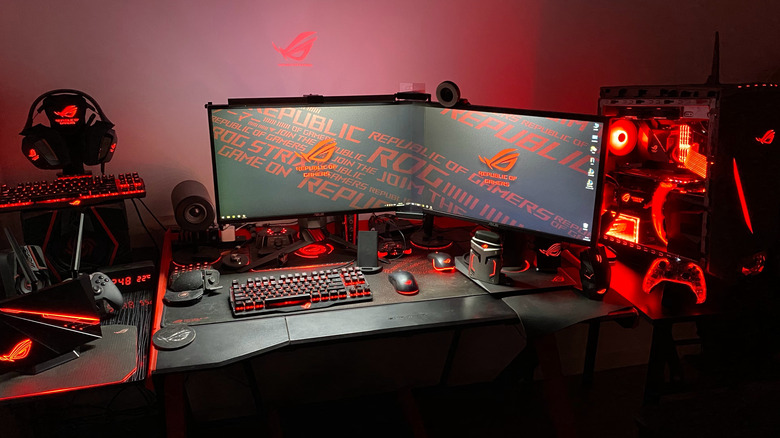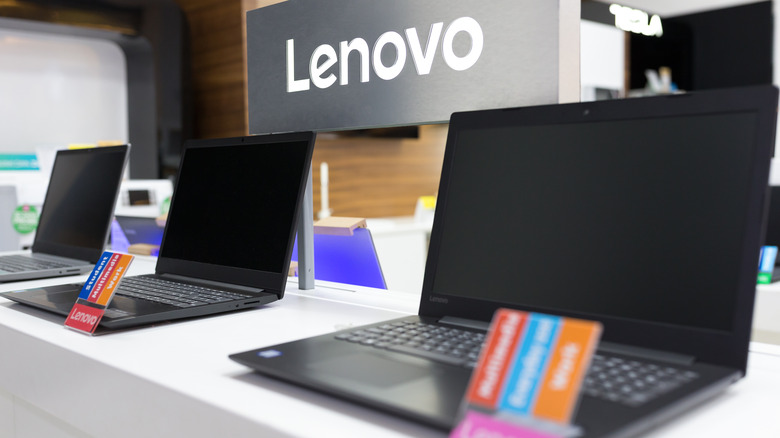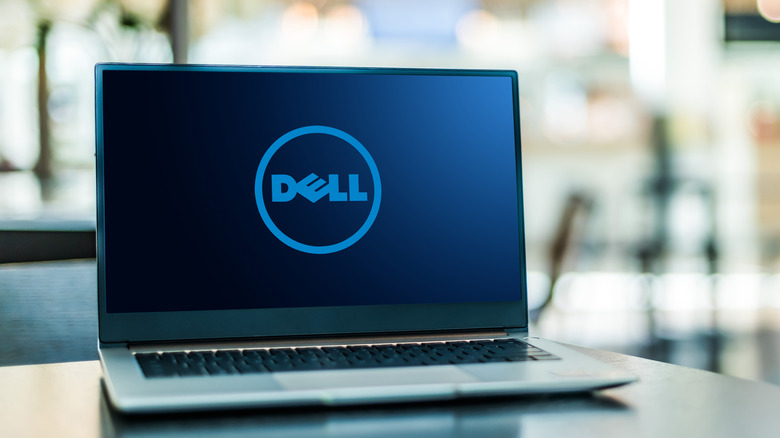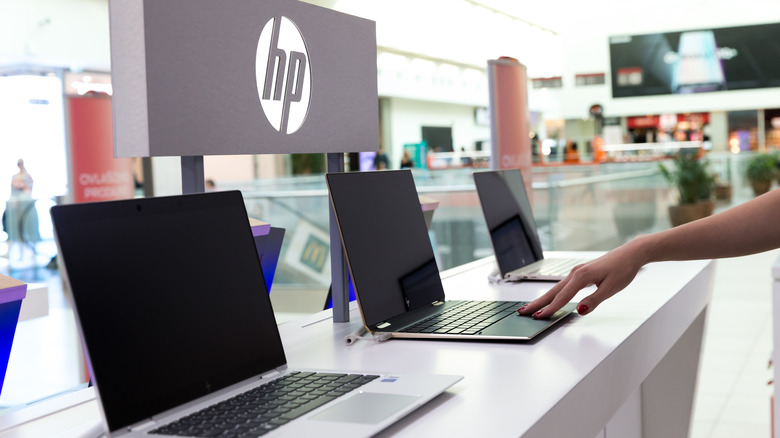Major PC Brands Ranked Worst To Best
Personal computers continue to be as popular as ever. As potential buyers search for ways to maximize entertainment and productivity with new PCs, computer manufacturers are continuing to find ways to deliver more powerful machines with cutting-edge features at a lower price point. Even the culture of consumers building their own PCs for work and gaming has done little to slow down the market on pre-built PCs, even if year-over-year sales figures are down with the COVID-19 pandemic in the rearview mirror.
Despite these market fluctuations, the convenience of buying pre-built workstations and laptops will always appeal to consumers. Laptops continue to have a well-established place in the market thanks to their natural portability combined with consumers' desire for sleeker designs with more power. Pre-built desktops are also viable for those lacking the time, skills, or interest necessary to build their own PC by hand. However, buying a new PC is almost always a significant investment, so it is essential for consumers to know the strengths and weaknesses of some of the most prominent brands on the market before making a decision.
Here are 12 of the world's biggest and most visible PC brands ranked from worst to best.
12. Toshiba
Toshiba's television may be a preferred choice for Fire TVs, but that doesn't necessarily mean the Japanese company's televisions compare favorably with the competition, and the same can be said about its PCs. While most major PC brands make both high and low-quality models, Toshiba computers are traditionally known for their poor quality and basic design across the board. Even worse, Toshiba's PCs often come pre-loaded with plenty of annoying bloatware, preinstalled software that is usually superfluous to a device's functionality and hogs unnecessary space. These programs slow down a PC significantly, which could leave a negative first impression with consumers powering on their device for the first time.
On the plus side, Toshiba can offer its customers a wide array of affordable laptops for different needs. Some of the company's Chromebooks can be found for under $300. However, many of Toshiba's budget PCs do not come with the 1080p display that is becoming increasingly prevalent with top manufacturers. This means consumers must pay a premium for a Toshiba laptop or workstation with a 1080p resolution.
Beyond these quality issues, the company announced in 2020 that it was selling its laptop and PC division, making continued support for Toshiba products questionable. With potential customer support issues and a middling-to-below-average product, Toshiba might be a company to steer clear of, at least as far as PCs are concerned.
11. Samsung
Samsung's reputation in the tech world far supersedes that of Toshiba, largely thanks to its line of Galaxy smartphones and tablets. However, the South Korean-based company does not quite have the same foothold in the PC market. Past designs have fallen on poor battery life and a lack of durability, causing Samsung to fall behind its competitors. However, unlike Toshiba, this major brand has shown signs of improvement in recent years with its selection and innovation. The Notebook Odyssey is a premium gaming laptop that, while expensive, comes in a full aluminum casing that sets itself apart from many competitors still using plastic.
However, many Samsung PCs suffer from the same issues seen in other Samsung products. When decked out with the latest and greatest features, Samsung's smartphones and television options can be pricey. The Samsung Galaxy Book Pro, for example, comes with an AMOLED screen, a variation of OLED technology better suited for portable devices. Such technology is more of a luxury than a need with netbooks, so while consumers looking to splurge will be happy with such a product, those looking for something more cost-effective may feel left out in the cold.
Meanwhile, Samsung machines generally lack quality parts that lend to improved PC performance, such as CPU, GPU, RAM, and storage space. Samsung PCs may lag behind some of the industry's biggest heavyweights, but given the company's resources and growing momentum, there is no guarantee this will always be the case.
10. VAIO
If the name VAIO rings a bell, it is probably because Sony's line of VAIO laptops ruled the market throughout the 2000s. However, when sales rapidly declined in 2014, Sony opted to sell 95 percent of its stake in its VAIO PC business to Japan Industrial Partners, which continues to produce PCs under the VAIO name to this day. As a result, VAIO continues to make electronic devices independently and consumers can rest easy knowing they are getting a quality product with VAIO in 2023 — albeit with a few drawbacks.
VAIO laptops can claim strengths in at least four areas: Build quality, battery life, performance, and design. VAIO developed a reputation during the Sony era for producing some of the sleekest laptop designs of the time, and that continues to hold true with modern efforts such as the VAIO FE14. In fact, the FE14 checks nearly every box of a budget laptop minus the price point, which is more comparable to mid-range laptops. The impressive battery life gives this type of VAIO laptop an edge over some of its competitors, but an underwhelming display and mischaracterization as a budget laptop producer hurt the company's standing as a top PC brand.
The VAIO Z, VAIO's premium laptop, suffers many of the same drawbacks at an even higher price. Additionally, VAIO's specialty in laptop design means they do not produce workstations, capping its upside in the context of PC manufacturers in 2023.
9. Corsair
Corsair's standing in the modern PC market is that of a company best known for producing parts for those looking to build their own workstation, such as cases, power supplies, and coolers. However, Corsair is also known to produce its own PCs, particularly when it comes to prebuilt gaming PCs. Consumers could do much worse than Corsair, and the company's production of aftermarket parts makes it a painless process for Corsair owners to upgrade their devices on a whim. However, building from scratch continues to be the most viable way to own a Corsair PC, as consumers can expect to pay a premium for any of this company's prebuilds.
Corsair is also known for its Voyager line of gaming laptops. The Voyager uses a unique, modern design housed in an aluminum chassis that helps it stand out from other gaming laptops. Voyagers also include a macro bar with 10 touch buttons and a small center display above the keyboard, not unlike what is seen in modern Macbook Pro models.
However, for all its innovation and cosmetic advancements, the Voyager trails the competition in its core function: gaming performance. With a starting price of around $2,500, Corsair's laptops meet the same roadblocks as its workstations, limiting the company's ability to rank much higher than its competitors. However, its PC parts are as durable as they are effective, giving Corsair a slight edge over other premium brands.
8. MSI
Micro-Star International, or MSI for short, is a company that specializes in PC gaming, similar to Corsair. Also like Corsair, MSI manufactures powerful parts for PC builders, albeit at a more affordable price tag. The same can be said for its pre-built models. Those looking for a budget-to-mid-range gaming PC should consider MSI, as the company offers parts and models for all budget sizes. The company's involvement in aftermarket PC parts also makes its PC easy to upgrade manually. Most of MSI's gaming desktops start at around $1,000, and can get as high as $5,000 for its premium offering, the MSI MEG Trident X2.
One of the biggest issues plaguing MSI as a company is global availability. The Taiwanese company's models and parts are not readily available in all regions, meaning consumers in the United Kingdom and Australia may have a tough time purchasing an MSI model because the company lacks the distribution footprint of some of the market's heavyweights. This means buyers set on buying an MSI PC might have to compromise and purchase a model other than their preferred choice — something that likely wouldn't occur when shopping for a workstation from a more prominent brand.
Additionally, MSI PCs lack the quality of cooling solutions necessary to top-of-the-line gaming setups and workstations, so anyone who picks up an MSI model will want to pay close attention to how effectively their PC is able to cool down.
7. Razer
Few gaming PCs are as reliable as those from Razer, an American-Singaporean company long known for manufacturing PC accessories such as keyboards, mice, and headsets. However, the company's strongest piece of hardware is the Razer Blade line of laptops — which also happens to be one of the best gaming laptops on the market. The Razer Blade 15-inch and 17-inch models are beautiful-looking machines that have all the bells and whistles a premium gaming laptop should have, such as ample computing power, a stunning display, and a sleek design. The Razer Blade 16 and 18-inch models announced at CES 2023 look to be the next evolution for the company's line of premium gaming laptops.
The Razer Blade's performance does come at a price, as the battery life is lacking, particularly on the bigger models. Razer also develops desktops and components specifically tailored to gamers, such as the Maingear M1 gaming PC and Razer Tomahawk mini gaming chassis.
While gaming hardware can sometimes serve a purpose for more than just those looking to use their computer for gaming, Razer's specialty towards gaming PCs and accessories actually hurts its standing in the context of the PC market. Since the company's focus is geared more toward premium PCs and parts, there is a lack of options for those looking to spend a little lighter on their next PC.
6. Microsoft
Microsoft, a giant in the PC industry for nearly 50 years, has historically been best known for developing the Windows operating system that has become standard in PC models worldwide. However, the tech juggernaut threw its hat into tablet and laptop manufacturing in the 2010s to expand its reach on all platforms and has settled in as a PC brand consumers can target. Today, Microsoft develops computers for people of all socioeconomic statuses and is known for pushing the boundaries of innovation. The Microsoft Surface Pro 9 is considered to be one of the very best 2-in-1 PCs on the market currently, or PCs that combine the features and functionality of a traditional laptop and tablet into one device.
Microsoft's reach in the PC market extends far beyond 2-in-1 computers, however. The Surface Book 2 and the Surface Laptop 2 are traditional laptops for those looking for a more standard computing experience and retail favorably in price compared to the Surface Pro series. Microsoft also makes a desktop computer, the Surface Studio 2+. The desktop offering doubles as a Surface Pro device thanks to its touch screen and retails for more than $4,000 for those looking to secure the 32GB RAM version. However, with a screen size of just 28 inches, consumers may feel left wanting more from Microsoft's premium-priced desktop offering.
5. Acer
Acer provides some of the most reliable PCs on the market and is a great brand for those looking to buy their first computer. The Taiwanese company has been making computers for decades and offers the diversity in its products necessary to be a top-five PC brand worldwide. However, Acer's computers are defined by more than simply computing power and price, as each model does something slightly different from the last. For instance, the Acer Swift series specializes in laptops that are thin and lightweight, similar to the MacBook Air. The Acer Spin family, meanwhile, is a 2-in-1 designed to compete with the best on the market.
In addition to manufacturing Chromebooks and computers to fit the needs of many, Acer also manufactures gaming PCs that should impress anyone looking for serious performance. Acer's gaming division, Predator, offers Triton laptops and Orion desktops with plenty of power to go around. Gamers choosing between a gaming laptop such as the Razer Blade or Acer's Triton may have a difficult decision to make, but the sub-$2,000 price point of the Triton may give it an edge for some.
Versatility and price aside, there isn't one particular feature that Acer computers excel at compared to other PC market heavyweights. However, the company's competitive prices and out-of-box reliability make it ideal for novice consumers.
4. Asus
Asus shares several commonalities with rival brand Acer, including its Taiwanese origins. However, Asus holds a slight edge over Acer thanks to the overall build quality of its PCs and its willingness to give consumers a little more bang for their buck in its premium offerings. The company is also known for manufacturing other computing components such as wireless routers, monitors, and graphics cards but aims to strike a balance between cost, quality, and innovation with its PC offerings. Asus' Chromebooks have long been a point of emphasis for the company, and the 2-in-1 Chromebook Flip C434 is a great option for those who are new to 2-in-1 laptops and are looking for a cosmetically strong product for the price.
Asus has also gained notoriety for the Zenbook, which features many models depending on the consumer's wants and needs. It even features an OLED option for those looking for a high-quality display. Asus also tailors a chunk of its business toward gamers with the manufacturing of aftermarket parts in addition to gaming PCs of the desktop and laptop variety through its Republic of Gamers subsidiary, also known as ROG. The ASUS ROG Gaming Desktop Intel Core i5 can currently be had for under $1,000 and is an ideal stationary setup for consumers looking to buy their first gaming PC.
Overall, Asus is a renowned brand that consumers should consider for any of their PC needs.
3. Lenovo
Lenovo's stature among the top PC brands in the world is reflected by its sales figures. The Chinese-based manufacturer leads the pack, accounting for nearly 25 percent of PC purchases in 2022. The company's impressive sales figures can be chalked up to its diversity in products and the popularity of its ThinkPad laptops, which have become a common sight in schools around the United States. Known for its trademark red dot trackpad resting in the middle of the keyboard, the ThinkPad is a simply designed PC that enables users to work quickly and efficiently, regardless of their experience with computers. ThinkPad computers are also reasonably priced, coming in at just under $1,000 with most retailers.
Top Lenovo products include the company's 2-in-1 offerings, such as the Lenovo Chromebook C330. This model is a truly convertible laptop that combines a design that mimics a mini-desktop computer with an exceptional battery life that helps it stand out amongst the competition. Lenovo is also known for its high-performance computers, although the prices do begin to hike for some of the company's higher-end builds. The company's ThinkStation line of desktop computers, for example, can retail for more than $4,000. Additionally, the amount of bloatware found on Lenovo products hurt its standing among the elite brands, though these nitpicks should not deter buyers looking for a well-designed PC at a reasonable price.
2. Dell
As one of the most prominent PC brands in the world, Dell makes computers for all types of consumers. While the Texas-based company is another brand popular in high school computer labs, in recent years the Dell XPS Series has become the company's calling card as one of the best business PCs on the market. The XPS series laptops come in 13, 15, and 17-inch size variants, and with attractive features such as OLED technology and long-lasting battery life, the Dell XPS Series is one of the best do-it-all laptops money can buy. They are also every bit as aesthetically pleasing and even come in the increasingly popular 2-for-1 variants.
Dell's other flagship line, the Inspiron series, fills out the company's profile of budget and mid-range PCs. The Inspiron Series can be had in desktop, laptop, and Chromebook form, making them great for meeting the basic needs of consumers. Dell also sells some of the best-known gaming PCs on the market through its Alienware division. Alienware PCs, both as workstations and laptops, are top-tier gaming devices with a unique cosmetic look — although they are often seen as overpriced.
Ultimately, the differences between the top PC brands on the market are often negligible and come down to minutiae — including personal preference. Still, Dell is indisputably among the giants of the PC marketplace and a great choice for anyone in the market for a new laptop or desktop.
1. HP
HP laptops might not be the bargain that Lenovo products offer, but anybody who opts to purchase an HP device can rest easy knowing they are getting a quality product. The strength of HP's PCs is likewise evident in their sales, because while Lenovo's budget offerings propelled it to nearly a quarter of the PC market share in 2022, HP was not far behind, posting roughly a 20 percent market share in 2022.
The company's Spectre series is a preferred choice for those prioritizing quality over price, with select models decked out with Nvidia graphics cards and Intel core processors to ensure a smooth and seamless computing experience. On the other hand, one of the company's cheapest laptops is a 2–in-1 Chromebook that stands up favorably to most competitors and can be had for under $400. Meanwhile, HP's gaming division, Omen, is a force to be reckoned with, as its desktop stands out as one of the preferred pre-builds among major brands. The HP Omen desktop has a clean look, provides gamers with ample power, and is easily upgradeable, making it an excellent choice for those looking to pick up their first gaming PC.
HP sits atop the PC market for offering value in more ways than one. HP has a diversity of products like any other major PC company but exhibits few of the weaknesses seen in different brands. Further, HP offers premium PCs at a fair price that will not completely break the bank.
